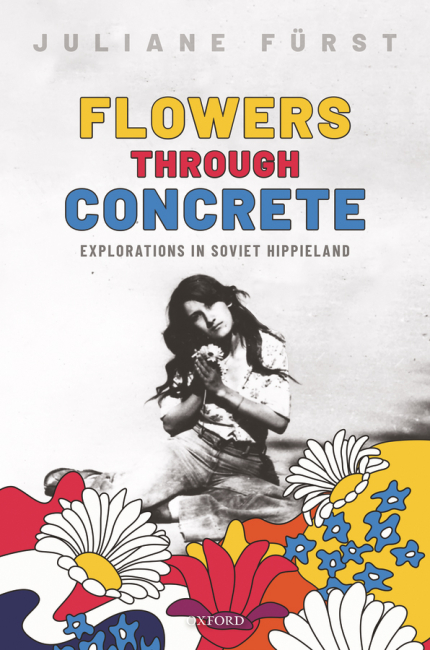Blumen, Bluejeans, eigenwillige Frisuren, Drogenkonsum, und vor allem – sanfte Sonnenuntergänge über kalifornischen Stränden: Allgemeine Vorstellungen von der Hippiekultur sind ebenso stereotyp wie unvollständig. Be-sonders die Betrachtung der Hippies als rein westliche Subkultur greift zu kurz. Juliane Fürst setzt sich in ihrem neuen Buch mit der Hippiekultur hinter dem Eiserenen Vorhang auseinander und fügt der Forschung zu sowjetischen Subkulturen völlig neue und überraschende Elemente hinzu.
- Hören Sie ein Interview mit Juliane Fürst in Folge 4 des ZZF-Podcast.
- Lesen Sie ein Interview mit der Autorin in der Los Angeles Review of Books
- Lesen Sie ein Interview mit Juliane Fürst in The Wire
- Hören Sie einen Beitrag von Deutschlandfunk Kultur über eine von Juliane Fürst kuratierte Ausstellung zum Thema
- Lesen Sie eine Rezension auf H-Soz-Kult
Flowers through Concrete: Explorations in Soviet Hippieland takes the reader on a journey into the lives and thoughts of Soviet hippies. In the face of disapproval and repression, they created a version of Western counterculture, skillfully adapting to, manipulating, and shaping their late socialist environment. Flowers through Concrete takes its readers into the underground hippieland and beyond, situating the world of hippies firmly in late Soviet reality and offering both an unusual history of the last Soviet decades as well as a case study of transnational youth culture and East-West globalization.
Flowers through Concrete is based on over a hundred interviews, declassified documents, and private archives hidden for many decades. It tells the almost forgotten story of how hippie communities sprang up across the Soviet Union in the late-60s, often under the tutelage of the rebellious offspring of privileged households at the heart of the Soviet establishment. It charts how these communities linked up to create an impressive network with elaborate customs and rituals, ensuring its survival for more than two decades.
Flowers through Concrete recounts not only a compelling story of survival against the odds - hippies who were harassed by police, shorn of their hair by civilian guards, and confined in psychiatric hospitals by doctors who believed non-conformism was a symptom of schizophrenia - but also advances a surprising argument. It suggests that the land of Soviet hippies and the world of late socialism were not entirely incompatible, but in fact meshed surprisingly well. Ultimately, it was not the KGB but the arrival of capitalism in the 1990s that ended the Soviet hippie sistema.
Juliane Fürst leitet am ZZF die Abteilung I »Kommunismus und Gesellschaft«.
Juliane Fürst is the co-head of Department I »Communism and Society« at the ZZF.
